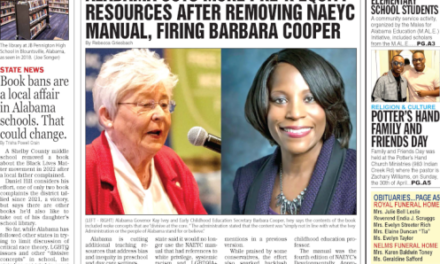By Catherine Pugh,
Special to the AFRO
The passage of national legislation like the Inflation Reduction Act (IRA), the American Rescue Plan Act (ARPA), the Chips and Science Act and the Bipartisan Infrastructure Law call attention to President Biden’s Justice 40 Executive Order.
They raise the question: how aware are state and local governments when it comes to the devastating impact of harboring resources?
The Justice 40 Order clearly states that 40 percent of the overall benefits of certain federal investments are to flow to disadvantaged communities that are marginalized, underserved, and overburdened by pollution.
The categories of investment include climate change, clean and affordable efficient energy, clean transit, affordable and sustainable housing, training and workforce development, remediation and reduction of legacy pollution and the development of critical clean water and wastewater infrastructure.
Almost any federal agency you can think of is subject to Justice 40, from the Army Corp of Engineers to the Departments of Agriculture, Energy, Environmental Protection, Housing and Urban Development, Interior, Health and Human Services, Labor, Transportation and Veteran Affairs.
Billions of dollars are being spent by federal agencies– and just to provide an example– $50 billion is being spent to make communities safe and infrastructure able to withstand the impact of climate change. Communities of color need not miss out or suffer like in Jackson, Miss., where climate change flooded the Pearl River, demonstrating the fragility of the water infrastructure. The result left 150,000 residents without safe drinking water.
While water pressure has been restored, the water crisis remains.
Another example is that every state has been given $5 million dollars to plan connectivity and is guaranteed another $100 million. Those same states could gain up to $800 million to assure that communities have internet access.
Recently, the Black Lives Matter organization raised its voice when calling together some groups to address environmental justice, including climate change plaguing Black communities.
We should all be listening.
The problem being faced in many Black communities is that they are governed by some Republican Governors who don’t want to see a Democratic agenda be successful– even if the focus is on equalizing the playing field.
President Biden’s Jan. 27, 2021 signing of Justice 40, Executive Order 14008, reminds me of Maryland’s Minority Business Law that needs to be increased to accommodate business and population growth in communities of color.
It has been over a year since Justice 40 was signed by President Biden and people including government leaders are still asking “What is Justice 40?”
While speaking at a recent Congressional Black Caucus Foundation workshop on doing business with the federal government, National Urban League President and CEO Marc Morial highlighted that “not millions– but billions of dollars are available to marginalized communities through the passage of the Inflation Reduction Act, the Chips and Science and the Bipartisan Infrastructure law.” Morial declared that all cities and states should put Executive Orders in place to assure that monies do flow to communities of color.
When Biden says “I am doing my part,” he is right. The rest is up to community leaders, mayors, county executives, governors to do the rest. Get the money. I can’t think of a city, county or state that does not need the influx of capital that Justice 40 can bring.
Justice 40 calls for community engagement. The question that needs to be raised is where are those community engagement meetings taking place?
Our communities need more than roads and bridges fixed. Homelessness is growing in almost every city and state in America. Housing has become unaffordable for too many. Old and damaged lead pipes permeate America’s water system and can now be fixed.
Healthcare costs relating to drug addiction continue to escalate. Our schools still face air conditioning issues in the classroom and some fountains remain covered because they can’t provide safe drinking water. Many of our children continue to suffer from lead paint poisoning. Training programs that can provide futures for the unemployed and underemployed are not being funded at the levels they should, but they could be with Justice 40.
There are groups like the ReGenesis Institute that are going directly to community members and offering to help put in place processes for combining community and civic engagement and executive oversight.
Why did Morial recommend repeatedly that executive orders be put in place? Simply stated: executive orders provide oversight and a roadmap to navigate federal agencies who are looking for communities to work with and can be assured that the federal dollars will flow to communities of color and the disadvantaged where they are needed most.
The ReGenesis Institute, started by Harold Mitchell Jr. 20 years ago in Spartanburg, South Carolina, grew out of frustration for what was happening to his own family health wise. The result was Mitchell obtaining a $20,000 grant from the Environmental Protection Agency, which he leveraged over the years into $300 million dollars for the cleaning up of three Brownfields, capping off leaking wells spewing poisons into waterways, the building of a solar far and a health clinic.
Mitchell and the ReGenesis Institute have become the blueprint for how American should be aggressively addressing Environmental Justice Issues particularly as it relates to climate change in similar communities. He sits on the White House Environmental Justice Advisory Council.
“The money for environmental justice is on the table now, “ says Mitchell, “and communities of color need to make sure they access it.”
Mitchell agrees with Morial that executive orders should be put in place by every city, state, county, and state government to assure that the process of monitoring and attracting federal dollars reflect the needs of communities of color, “we are providing communities with examples of executive orders at every level.”
The restoration of America and its neglected communities of color depends on our country’s willingness to put politics aside– both Democrats and Republicans–and engage communities with the goal of sharing the opportunities.
The opinions on this page are those of the writers and not necessarily those of the AFRO. Send letters to The Afro-American • 145 W. Ostend Street Ste 600, Office #536, Baltimore, MD 21230 or fax to 1-877-570-9297 or e-mail to editor@afro.com
Help us Continue to tell OUR Story and join the AFRO family as a member –subscribers are now members! Join here!
The post Commentary: Justice 40…for the greater good appeared first on AFRO American Newspapers .











